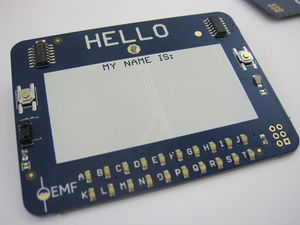SiNE: Difference between revisions
(Created page with "thumb|300px ==About SiNE== SiNE: Investigating the Neighbourhood of EMW<br /> Each attendee of Electromagnetic Wave receives a SiNE badge which h...") |
No edit summary |
||
| Line 1: | Line 1: | ||
[[File:SiNE_Front_Angle.JPG|thumb|300px]] | [[File:800px-SiNE_Front_Angle.JPG|thumb|300px]] | ||
==About SiNE== | ==About SiNE== | ||
SiNE: Investigating the Neighbourhood of EMW<br /> | SiNE: Investigating the Neighbourhood of EMW<br /> | ||
Revision as of 15:54, 9 May 2017
About SiNE
SiNE: Investigating the Neighbourhood of EMW
Each attendee of Electromagnetic Wave receives a SiNE badge which has two purposes; firstly it allows you to take part in a treasure hunt based around the boat. By solving the clues you will be directed to an object or location either on or near the Stubnitz. The clue letter is also the first letter of the answer - when you arrive at the correct location you will find a large matching letter. Hold your badge in front of the letter, and the corresponding light on your badge will illuminate. The first person to solve all the clues and bring their fully illuminated badge to the ticket desk wins two tickets to Electromagnetic Field 2014. Anyone else solving the puzzle will be allowed to choose from a selection of prizes for as long as they last!
The second purpose of the badge is as a locator beacon - as people walk around the boat they will create a trail of the places they visit and the talks they attend. We hope to use this information to better schedule our future events. The data will be made available publicly after the event, and we'll provide a way of finding their badge identifier for those who want to get their own trail.
Scavenger hunt
As you locate the beacons hidden around EMWave more of your LED's will light up. To save power the LED do not stay on all the time and the beacons you have seen are flash in groups every few seconds.
The beacons you have seen is store in the EEPROM and so the data is preserved even if you remove the power
Clue List
Now EMWave has past here is the clue list: (Will add answers soon --Dpslwk (talk) 14:21, 6 May 2013 (UTC))
- A: I can't believe it's not butter!
- B: Bond would be comfortable here and he has a licence.
- C: One of your EMW badge designers.
- D: One of your EMW badge designers.
- E: Powered by Orange.
- F: ____ and aft.
- G: False patch of nature.
- H: All _____ on deck!
- I: Initial illumination, informing incomers.
- J: Java's main export.
- K: A nautical speed, mooring the Stubnitz.
- L: Budding safecrackers.
- M: An essential orienteering tool.
- N: A German Venus? Not exactly Botticelli!
- O: Fun times in the Emergency Room!
- P: A most unusual Landrover.
- Q: Encoded in a massive square.
- R: A lifesaver in Germany.
- S: Quite possibly the most unusual holiday home.
- T: One of your EMW badge designers.
Locator ID
Each badge is programmed with a unique ID, that is transmitted about 5 times a second. There will be Raspberry Pi's doted around the ship, collecting data.
EMF will not know your badge ID, as there are handed out at random.
A badge's ID is shown on the LED using binary encoding.
This is done at power up, or by pressing and holding the "ID" button
If you do not wish to have your badge trasnmitting an ID you can clear it by holding the "Erase" button for about 5 seconds.
The badge ID is 9 bit's long, these are displayed across the A-I LED's, a lit LED is 1 and unlit is 0, LSB first.
Example if LED's A D E and H are lit then we have 010011001 in binary or 0x099 in HEX or 153 in decimal.
Unfortunately due to a lack of time the Raspberry Pi's were never setup, as so no data was collected.
Sponsors
SiNE was only possible thanks to our sponsors:
- Twilio A Cloud communications company sponsored the parts need to make badges.
- Ciseco A Nottingham based electronics company that make low power wireless radios, donated the time to build the badges on there SMT assemble line.
DevBoards
Before designing the final SiNE badge we built three development boards, not bothered about the looks, they were built to test the hardware and wiring between the parts.
Once it was confirmed that the parts worked together they were passed onto the software developer to start work on the code need for the scavenger hunt and location tracking.
Using these development boards meant the software was ready to go around the same time as the final badges were produced.
Badge Hacking
We actively encourage users to hack there badge better and hope the information provided below will help
Flashing and Fuses
We use avrdude and an ISP programer to flash the ATTiny44A Example command lines can be found in the Makefile in the SiNE-Firmware github
avrdude part flag (-p) is t44
Fuses:
- Low: 0xC2
- High 0xD7
- Extended: 0xFF
Components
The following parts were used: (data-sheet links to come)
- ATTiny44A - MCU running all the code
- 74HCT164AD - Shift register connecting the matrix of LED's
- LED's - 20 0805 LED's for each of the hidden locations
- IR Receiver - listening for the unique ID of each of the hidden beacons
- IR Sender - sending out the badges ID for Location tracking
- 2032 Coin Cell - Power for the day and possible more
- ISP header - Used for programming of the ATTiny44A
